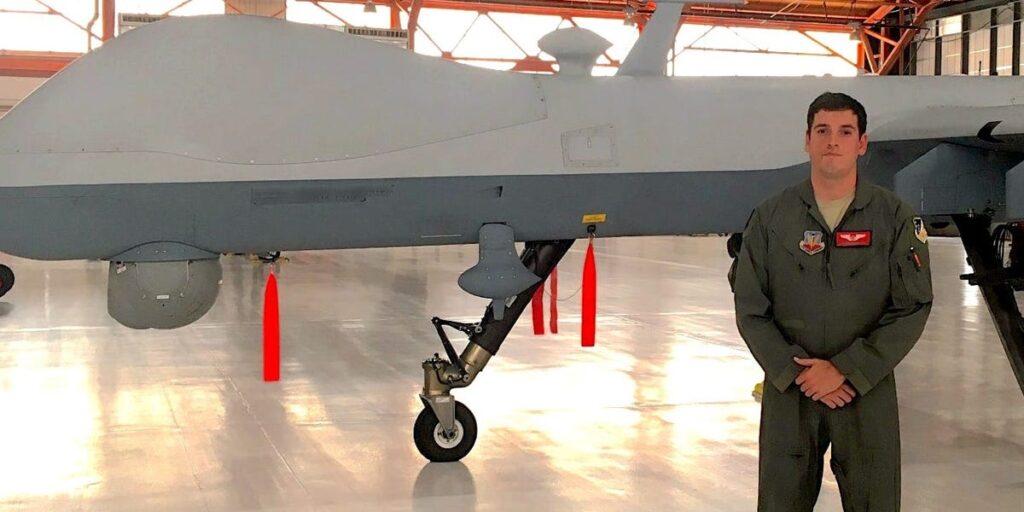“My first strike was January 28th, 2013, at 6:49 in the morning,” Tanner Yackley told Business Insider’s Maggie Cai in a recent interview. “It ended up being a cave in the middle of nowhere, and there was a handful of people there that they wanted us to take out,” he said.
Yackley enlisted in the US Air Force in 2010 at age 18 and was discharged in 2018. See an extended interview with him for BI’s video series “Authorized Account” below:
Recalling that first strike, he said, “Every thought that was going through my mind was all about the technical aspects of the employment, you know, of shooting that weapon. There wasn’t much as far as being able to stop and think, ‘Wow, I’m about to take a life.'”
During his time in the Air Force, Yackley said he logged over 3,000 combat hours as a drone sensor operator. Based in the US as a staff sergeant, he spent most of his time controlling drones on the other side of the world through real-time video footage on a screen.
People often have this misconception that the job is similar to a video game, but nothing could be further from the truth, Yackley said.
“You’re making life or death calls every single day,” he said, adding that, “There’s not a single game in the world that can prep you for what you’re going to do, and the decisions that you’re going to have to make, and the high-caliber level that you’re going to have to operate at.”
“Back in 2013, I didn’t have a clue what it was doing or how it was changing me,” Yackley said.
The US Air Force did not respond to a request for comment from Business Insider.
Why Yackley left the US Air Force
After years on the job, Yackley was burned out. “At that point, my body was just tapped, and I couldn’t do that work anymore.”
It wasn’t just the nature of the work that took a toll; it was also the demanding schedule. Yackley was on a team that worked 24 hours around the clock, divided into three groups, each working 8-hour shifts.
To ensure that no one group was on the midnight shift for too long, each group rotated to a new shift every seven weeks. Yackley was on this rotating shift schedule for years.
“The shift work in itself was just grueling,” Yackley said. He started to recognize when he was about to rotate to a new shift. “I would start staying up later and later and later,” he said, which disrupted his sleeping patterns and ability to get a full night’s rest.
An estimated 64.3% of active-duty servicemembers do not get the recommended seven hours of sleep per night, according to the DOD’s most recently available Health Related Behaviors Survey, published in 2018. And studies have found that sleep deprivation increases the risk of PTSD, which Yackley said he has.
Life after the military
“To be frank, being a drone operator, you know, it’s taken a toll on me in my life, and my family, my relationships,” Yackley said.
“It’s difficult for me to maintain relationships. It’s difficult for me to maintain friend circles. It’s difficult for me to talk to family about it, because unless somebody actually sat in that box and did the job, they don’t understand. They can try to, but most of the time it ends up doing more harm than good — trying to relate to it instead of just being supportive in the moment,” he added.
In May, Yackley founded the organization Remote Warrior to help spread awareness about drone operators’ mental health.
Yackley said that he never disagreed with an order and that he’s proud of the work he did. “They were still targets at the end of the day. They were still doing bad things.”
Read the full article here


